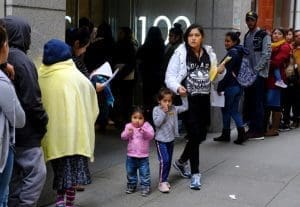Trump just made it harder for immigrants to get food and housing
The ‘public charge’ test can once again be used to deny immigrants visas or green cards if they receive public assistance — even during a pandemic.

It’s official: Visa and green card seekers can again be denied legal status if they apply for food stamps, Medicaid, or other public assistance.
The Trump administration reinstated the “public charge” wealth test Tuesday — amid a global pandemic.
The public charge rule, invoked by the Trump administration in August 2019, is essentially a litmus test for immigrants requiring them to demonstrate that they won’t become “public charges,” or burdens on the American economic system.
Once the policy is implemented, the Trump administration could deny visas or green cards if immigrants needed — or were even deemed likely to need — cash assistance, food stamps, Section 8 housing assistance, or Medicaid.
According to Boundless, a Seattle-based company that assists immigrants in navigating the legal process: “Among all the measures that the Trump administration has pursued so far to constrain legal immigration, the ‘public charge rule’ could have the biggest impact.”
This archaic and racist rule has its roots in 1882, when Congress passed it after the Chinese Exclusion Act as a mechanism to deny visas to anyone who “(was) likely at any time to become a public charge.”
Unsurprisingly, it was most often used to target low-income Chinese immigrants in Massachusetts and New York.
“This is the beginning of a high point in xenophobia,” Erika Lee, historian and University of Minnesota professor told global news program “The World,” “and we’ve already barred Chinese immigrants about five months before, and then the 1882 Immigration Act, which is the first federal immigration law to regulate immigration in general, bars paupers or persons likely to become a public charge.”
Lee noted that the public charge standard has been unevenly applied throughout American history, disproportionately targeting immigrant communities of color rather than European immigrants — particularly during the Great Depression.
“The ‘likely to become a public charge’ clause has always been used as a cover for more racially discriminatory immigration restrictions,” Lee said.
Five state district courts stayed Trump’s rule, and one federal injunction was put into place by New York federal Judge George Daniels in October 2019.
In January, the Supreme Court overruled the federal injunction and permitted the Trump administration to implement the public charge test. The court’s more liberal wing, Justices Stephen Breyer, Elena Kagan, Sonia Sotomayor, and the late Ruth Bader Ginsburg, voted against it.
Daniels once again blocked the implementation in July 2020, arguing that the coronavirus pandemic rendered the Supreme Court’s January ruling obsolete. But on Sept. 11, the U.S. Court of Appeals for the 2nd Circuit in New York stayed Daniels’ injunction, meaning the Trump administration could go forward.
Reinstating such a rule during a global pandemic carries with it broader implications of harm to the immigrant community.
Studies have repeatedly shown that immigrant communities are disproportionately affected by the coronavirus. Many immigrants are uninsured or underinsured, with limited health care options. Immigrants are also more likely to ride mass transit to work and work in industries with increased coronavirus exposure due to face-to-face contact with the public.
Of most urgent concern, they may avoid seeking necessary health care out of fear of jeopardizing their immigration status. Racial and ethnic disparities in COVID-19 outcomes and death rates have been well documented.
According to the Centers for Disease Control, African American patients are 4.7 times as likely to be hospitalized for COVID-19 and 2.1 times more likely to die from the virus than white patients. Latinx patients are 4.6 times more likely to be hospitalized and 1.1 times more likely to die after contracting the virus.
“What were previously theoretical harms have proven to be true,” Daniels wrote in his 31-page ruling in July temporarily halting the public charge test. “We no longer need to imagine the worst-case scenario; we are experiencing its dramatic effects in very real time.”
Published with permission of The American Independent Foundation.
Recommended

Ohio doctors fear effects of emergency abortion care case set to go before U.S. Supreme Court
A federal law that allows emergency departments to treat patients without regard to their ability to pay will be under U.S. Supreme Court scrutiny this week, and Ohio doctors are concerned about the case’s local impact on emergency abortion care.
By Susan Tebben, Ohio Capital Journal - April 23, 2024
House GOP votes to end flu, whooping cough vaccine rules for foster and adoptive families
A bill to eliminate flu and whooping cough vaccine requirements for adoptive and foster families caring for babies and medically fragile kids is heading to the governor’s desk.
By Anita Wadhwani, Tennessee Lookout - March 26, 2024
U.S. House Speaker Johnson says IVF should be protected — just not by Congress
U.S. House Speaker Mike Johnson said Thursday that it’s up to states and not Congress to preserve access to in vitro fertilization, weighing in on a growing national debate and campaign issue.
By Jennifer Shutt, States Newsroom - March 14, 2024









































































